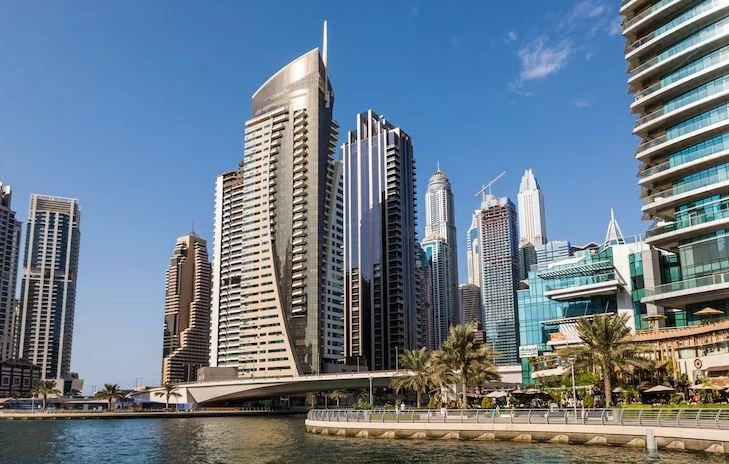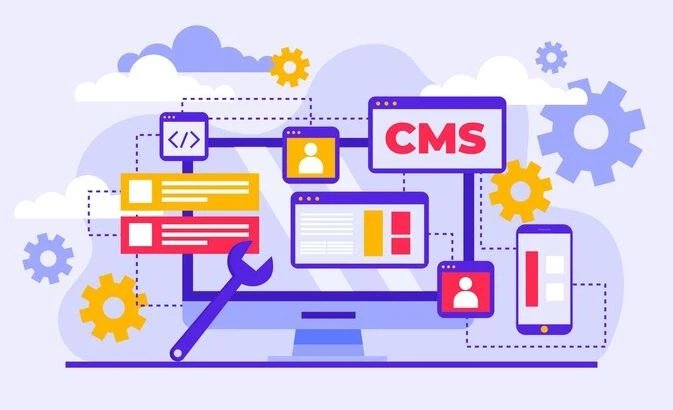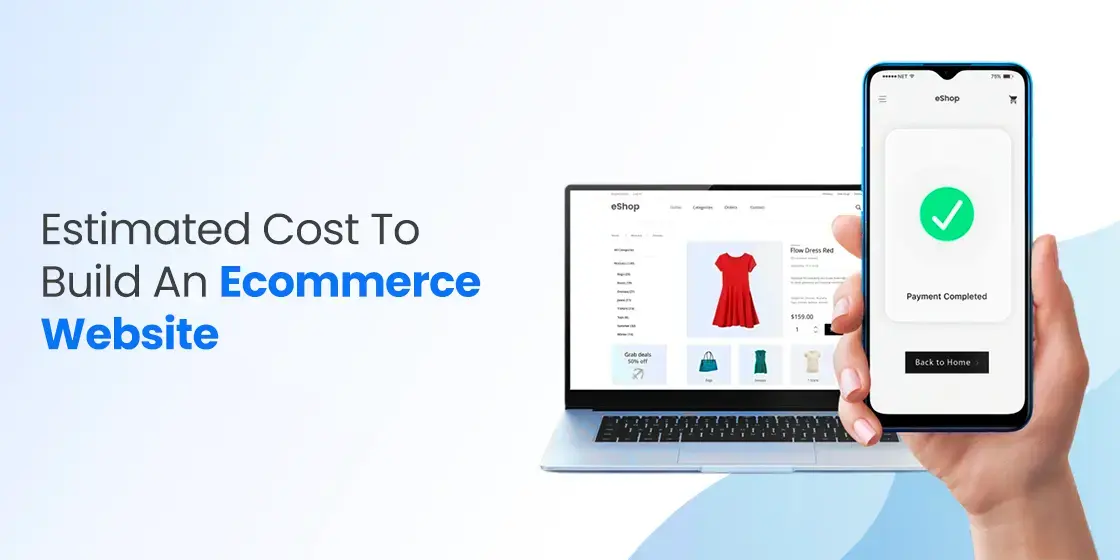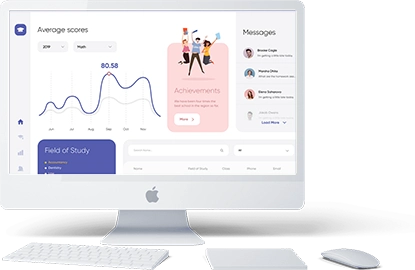Table of Content
Know About the Factors Involved in Deciding the Cost of Ecommerce Website Development
The industry of ecommerce is evolving quite rapidly in the UAE. During the last few years, many companies have opened their online stores in UAE to engage a massive pool of customers. This has increased the demand of ecommerce website development, as more businesses are venturing into this area to move forward with the trend. If you are also looking to launch an online store, you must need to know about the ecommerce website development cost in Dubai. You need to know which app development services are offering nominal rates, as that will help you to set aside a decent budget.
There are various companies currently working in Dubai, offering quality ecommerce app/website development solutions. They offer different types of pricing, based on the timeline and critical features involved in the project. It is important for you to evaluate the development cost given by every company, as that helps to make better decision. If you will not pay attention to this analysis, then cost allocation will become difficult for you, and that can bring difficulties in the development.
In this blog, we will discuss all the factors that could influence the website development cost in Dubai. It is important for you to know about these points, especially if you are new to the industry. Let’s start from the basics understanding the rising popularity of online stores in the UAE. This will let us know why the demand of ecommerce apps is also evolving day by day.
Popularity of Ecommerce in the UAE

The popularity of ecommerce in the UAE has been on a significant rise over the past few years, driven by several factors such as a tech-savvy population, high internet penetration, and an evolving digital infrastructure. The UAE boasts one of the highest smartphone penetration rates globally, providing a fertile ground for the growth of online shopping sites in UAE. Moreover, the government’s strong emphasis on digital transformation, including initiatives like UAE Vision 2021, has created a conducive environment for e-commerce to flourish.
Consumer behavior in the UAE has also shifted dramatically, particularly after the COVID-19 pandemic, which acted as a catalyst for ecommerce growth. During the pandemic, there was a marked increase in the number of people shopping online for groceries, fashion, electronics, and even luxury goods, as conventional stores faced restrictions and lockdowns. This shift has led to a more permanent change in purchasing habits, with many consumers continuing to prefer online shopping for its convenience, variety, and competitive pricing.
The UAE’s ecommerce market is becoming increasingly competitive, with both local and international players vying for market share. Major players like Amazon.ae and Noon.com have invested heavily in building advanced supply chain infrastructures, offering quick delivery and a wide range of products to cater to the UAE’s affluent customer base. Simultaneously, niche platforms focusing on fashion, electronics, and groceries are also gaining traction, supported by innovative marketing strategies and personalized customer experiences.
Ecommerce Website vs Custom App Development: Which One to Consider?

Starting an online shopping business involves making crucial decisions about the best platform to use, and this choice is far from straightforward. The online commerce landscape is crowded with a variety of platforms, each offering different features, pricing models, and capabilities. These range from well-known hosted solutions to open-source options and fully custom-built sites. Each platform has its advantages and limitations, so selecting the right one depends on several factors, including the size of the business, anticipated traffic levels, scalability needs, and the desired level of customization.
While open-source ecommerce platforms like WooCommerce, Magento, and OpenCart are popular for their flexibility and cost-effectiveness, they may not always be the best choice for businesses expecting rapid growth or high traffic volumes. Open-source solutions often require significant technical expertise to manage because everyone with limited knowledge cannot handle its critical processes. Moreover, they may lack some advanced features out-of-the-box, which can limit their ability to provide a seamless and highly personalized shopping experience as businesses scale up.
In contrast, opting for a custom-developed ecommerce platform can offer a more robust and scalable solution that meets the unique needs of a business. Custom development allows for greater flexibility and can be tailored to integrate cutting-edge technologies. Additionally, a headless ecommerce approach—where the front-end presentation layer is decoupled from the backend ecommerce functionalities—can provide faster load times, improved user experiences, and easier integration with various third-party services.
Average Cost of Ecommerce Website Development in UAE

As a project stakeholder, understanding the average cost of ecommerce software development in the UAE is essential for effective planning and budgeting. Having a clear estimate helps you allocate the appropriate resources and financial backing needed for the project. The cost of designing a website in the UAE can vary widely based on several factors, such as the website’s size, complexity, and intended use.
On average, a standard website design may range from AED 5,000 to AED 10,000. This range gives you a rough idea of the expenses involved, but it is important to consider specific requirements and customization needs, which can significantly affect the overall cost.
For instance, a relatively simple website designed with minimal functionalities can start at around AED 6,000 for both design and development. However, if your website requires more advanced features—such as complex navigation, ecommerce integration, or custom functionalities—the cost will naturally increase.
Key Factors Driving the Ecommerce Website Development Cost in Dubai

There are various factors that increases or decreases the ecommerce website development cost in Dubai. As a project stakeholder, you need to know about these things, so that better budget allocation can be done. Let’s take a quick look at them below.
Complexity of Features
One of the most critical factors in determining the cost of an ecommerce project is the complexity of the overall product. The intricacy of the project often dictates the amount of time, resources, and expertise required to bring the idea to life. A more complex project may involve advanced technologies, intricate design elements, or a larger number of features and functionalities, all of which can significantly increase the development effort and, consequently, the cost. Understanding this complexity is essential for accurately estimating the project’s budget and timeline.
This aspect is typically addressed at the initial stage of the project planning process. Early identification of the project’s complexity helps both parties establish a clear understanding of what is involved, avoiding potential misunderstandings and setting realistic expectations. It allows stakeholders to align on key aspects such as the project’s scope, technological stack, potential challenges, and necessary resources, ensuring that both the client’s vision and the development team’s capabilities are well understood.
This process of understanding and defining the project’s complexity is often referred to as requirement analysis. Requirement analysis is a crucial step that enables the development team to grasp the specific objectives and goals of the ecommerce project. During this phase, the team delves deep into the client’s needs, gathering detailed information about the desired features, and special requirements. By thoroughly analyzing these aspects, the development team can create a comprehensive plan that aligns with the client’s vision, ultimately leading to a more accurate cost estimate and a successful project outcome.
Selection of Technology
The choice of platforms and technologies used in ecommerce website development is another crucial factor that influences the overall cost of a project. Different platforms, programming languages, and frameworks come with their own set of features, and associated costs. For example, developing a web application using a modern JavaScript framework like React or Angular might differ in cost compared to building a mobile application using Swift for iOS or Kotlin for Android system. Each platform has its own advantages and complexities, which can affect the duration of development, and the resources needed.
The selection of these platforms and frameworks is usually determined based on the specific objectives. The development team evaluates the best technological stack that can meet the project’s goals, performance needs, scalability, and mobile app security considerations. Some technologies are better suited for certain types of applications or industries, while others may offer a more flexible or cost-effective approach depending on the project’s scope. This decision-making process involves understanding the technical challenges, potential integration needs, and the overall architecture of the software solution.
In some cases, clients may also have specific preferences or requirements regarding the platforms or technologies to be used. These specifications can stem from a variety of reasons, such as the client’s familiarity with certain technologies, existing infrastructure that needs to be integrated, or a strategic decision to align with industry standards or future technological trends. When clients specify their preferred platforms, it gives the development team a clearer direction but can also limit flexibility in choosing potentially more cost-effective or innovative alternatives.
Region of Outsourcing Team
The geographic location of software developers is a significant factor in determining the overall cost of an ecommerce project. Developers from different regions often have varying rates based on the cost of living, demand for their services, and the economic conditions of their location. For example, developers from countries with a higher cost of living may charge more than those from regions where living expenses are lower. This geographic diversity allows businesses to explore a wide range of pricing options for their development needs, often leading them to hire remote teams to reduce costs.
However, it is essential to recognize that highly experienced and reputable freelancers can command premium prices regardless of their geographic location. There are numerous cases in the industry where top-tier freelancers charge substantial fees for their work, starting from $50/hour to even more in some specific cases. These developers often use their remote status to establish competitive pricing that aligns with their market value. Businesses seeking quality work often find that these high fees are justified by the skill level, and specialized knowledge these developers bring to a project.
Nonetheless, the choice of a developer is not made solely based on their location or cost. While some may think that hiring from a region with lower costs guarantees savings, the reality is that the right developer is chosen after a thorough evaluation of their capabilities, portfolio, and client feedback. Businesses often prioritize these factors over geographic considerations, ensuring they select developers who are not only cost-effective but also highly competent and capable of meeting the project’s unique requirements.
Security Measures
Incorporating robust security measures into ecommerce website development can substantially elevate both the financial investment required and the overall complexity of the development process. Building a secure application involves more than just coding; it requires integrating advanced security protocols, such as encryption, secure authentication methods, and ongoing vulnerability assessments. Each of these layers of protection demands additional time, specialized expertise, and resources, which can collectively drive up the costs and technical intricacy of the project.
However, these security measures are crucial for safeguarding sensitive data and maintaining the integrity of the application. In an era where data breaches and cyberattacks are increasingly common, protecting users’ personal information, financial data, and other sensitive content is paramount. A comprehensive security strategy not only prevents unauthorized access but also ensures that data is securely stored, transmitted, and managed, minimizing the risk of leaks or malicious activities.
Additionally, implementing strong security protocols is essential for ensuring that the application remains compliant with various industry standards and regulations, such as GDPR, HIPAA, or PCI-DSS, depending on the app’s target market and function. Non-compliance can lead to severe legal penalties, reputational damage, and loss of user trust, making security a top priority from the outset. By investing in robust security measures, IT companies in Dubai not only protect their users but also fortify their brand against potential breaches, ultimately securing their position in a competitive marketplace.
Using Third-party Components
Improving the integration of a classified ads application with existing software infrastructures often necessitates a substantial investment of both time and financial resources. This integration is crucial for ensuring seamless interoperability between the new app and the various systems already in use within an organization. Integrating with customer relationship management (CRM) platforms, for instance, allows for efficient management of user data and interactions, while connectivity with payment gateways ensures smooth and secure financial transactions.
The process of enhancing this integration involves several technical and logistical challenges. It requires careful planning and coordination to align the classified ads app with the existing IT ecosystem. These steps are necessary to ensure that data flows seamlessly between systems, preventing disruptions in service and maintaining the integrity of information across platforms. The complexity of this task often leads to increased development timelines and costs, as additional resources are needed to address potential integration hurdles and ensure a smooth rollout.
Investing in robust integration solutions not only enhances the functionality of the classified ads app but also contributes to greater operational efficiency and a better user experience. By enabling the app to interact effectively with CRM systems, payment processors, and inventory controls, businesses can streamline their processes, reduce manual data entry, and improve overall accuracy. Ultimately, this comprehensive approach to integration helps in maximizing the app’s value and ensuring that it operates cohesively within the broader software ecosystem.
Frequently Asked Questions
| Why ecommerce industry is evolving rapidly in the UAE? The ecommerce industry in the UAE is evolving rapidly due to a tech-savvy population and significant investment in digital infrastructure. Additionally, government initiatives and a strong focus on innovation support the growth of ecommerce platforms and services. |
| What is the cost to build an ecommerce website in UAE? The ecommerce website development cost in Dubai depends on various factors. From project features to close deadline, there are various things that can influence the website development cost in Dubai. Generally, the cost of an ecommerce project ranges from $40K to $100K, but it can increase more depending on features involved. |
| Which companies are best for ecommerce website development in UAE? There are various app development companies working in the UAE offering cutting-edge ecommerce solutions. Some of the top names among them includes StruqtIO, Fingent, Digital Gravity and more others. |
Final Words
That concludes our entire article in which we have discussed different factors that could scale up the cost of ecommerce website development in Abu Dhabi. It is important for you to remember these points and pick development partners according to them.
A lot of companies with little tech knowledge often make these mistakes while finding the development agency. They do not pay attention to the constraints involved in ecommerce website development in UAE, hence allocating a proper budget becomes difficult for them.
This blog will give them a proper heads up how the overall project cost is calculated. It will make their financial planning better, provided they evaluate everything with an open mind.

Empower your digital journey with StruqtIO - Your dedicated partner for cutting-edge custom software development, innovation, and digital transformative solutions. Harness the power of technology to elevate your business and redefine your digital landscape today.



